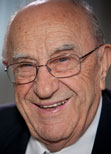June 16, 2009
David Bayer discusses life in his hometown of Kozienice after the German invasion of Poland in September, 1939. Shortly after the invasion David and his family were harassed, humiliated, and subjected to acts of violence by the German occupiers and their collaborators.
LISTEN
Esta página también está disponible en español.
TRANSCRIPT
DAVID BAYER:
I was crying; I was yelling and crying. And they were taking pictures and laughing. The humiliation was–I could have died there and I would have been happier.
NARRATOR:
Over 60 years after the Holocaust, hatred, antisemitism, and genocide still threaten our world. The life stories of Holocaust survivors transcend the decades and remind us of the constant need to be vigilant citizens and to stop injustice, prejudice, and hatred wherever and whenever they occur.
This podcast series presents excerpts of interviews with Holocaust survivors from the United States Holocaust Memorial Museum’s public program First Person: Conversations with Holocaust Survivors.
In today’s episode David Bayer talks with host Bill Benson about the changes in his hometown of Kozienice after the German invasion of Poland in September 1939.
DAVID BAYER:
Well the town was about six to seven thousand people; the majority were Jewish people–five thousand Jews lived in town. We lived in an area with a Christian section, and close to a church, because my father needed more space for the factory, so that’s why we lived over there, with our backyard, and a shop.
The population was a lot of shoe factories, a lot of tailors, a lot of watchmakers, and all kind of craftsmen. And the area was farm, the area near where my hometown, all the farmers came once a week to deal with the Jewish people.
We were very friendly; we had no problems. And there was a colony of ethnic Germans living not far, and we were very friendly with them. And we had no problem. We lived our lives and they lived theirs, and that’s it. But the Germans changed the whole situation.
BILL BENSON:
And once they came, things changed dramatically, right?
DAVID BAYER:
Everything changed dramatically. Like, when the Germans came in, we had to run away. We run to the forest. Everybody run out because they bombarded the town, and there was a lot of shooting. And when we came back, we find Germans ransacking our home, taking everything out, whatever they could–even the dishes.
And they were looking for shoes, for leather, for machinery, whatever they could take. We came back, after a few days [of] being in the forest, and there were Germans in our home. And my mother cried because one German pulled down a box of Passover dishes and broke it, from a shelf, broke everything, and whatever didn’t break, he took it.
BILL BENSON:
And those dishes had been in the family–
DAVID BAYER:
They’d been there for hundreds of years.
BILL BENSON:
Hundreds of years.
DAVID BAYER:
You know, porcelain and silver dishes. Well, the Germans left with laughter; they were making fun of us. One German even asked my father, “How come nobody likes Jews?”
And I was standing next to my father. My father said, “Because we don’t hit back.”
He made a gesture like, and I got so scared, I thought my father was going to hit that German. But [like] he said, we don’t hit back. And that’s why they don’t like us. And we never did hit back. My grandfather used to tell me if I had a fight in school: just don’t do it, put the other cheek. That’s what they always tell you.
And this is the problem we had. We were innocent people; we didn’t do nothing. We were only religious, we believed in God, we would pray every Saturday, you know, we had a good religious life. Then, the Germans start coming into our home, put a Star of David on our door, because we lived in a Christian area, they wanted to know we were living there.
And then one day they come in, one German came in, and he took me out–there were a few of them, but the one grabbed me–he pulled me out of the house to do some work for them. And there were a bunch of German soldiers standing there behind a church, and they wanted me to take out a battery from under the truck.
I never had a truck; I never saw a car in my town. We had horses and wagons. And I didn’t know how to do it. My hands were bleeding; it was cold already, there was snow on the ground, and I had to lie down in the mud to take the battery out. And they were standing and laughing, taking pictures.
Finally I got the battery out, and the acid spilled on me and burned all of my clothes, to the skin. I was crying; I was yelling and crying. And they were taking pictures and laughing. The humiliation was–I could have died there and I would have been happier.
Finally, I begged them, I said, “Let me go home. I will come back; I will change my clothes.” They didn’t let me go. So when it got dark they told me to go; no food, no nothing. My mother was home and crying, waiting for me.
NARRATOR:
You have been listening to First Person: Conversations with Holocaust Survivors, a podcast series of the United States Holocaust Memorial Museum. Every Wednesday at 1 p.m. from March through August, Holocaust survivors share their stories during First Person programs held at the Museum in Washington, DC. We would appreciate your feedback on this series. [Please take our First Person podcast survey (external link) and let us know what you think.]
[On] our website you can also learn more about the Museum’s survivors, listen to the complete recordings of their conversations, and listen to the Museum podcasts Voices on Antisemitism and Voices on Genocide Prevention.


